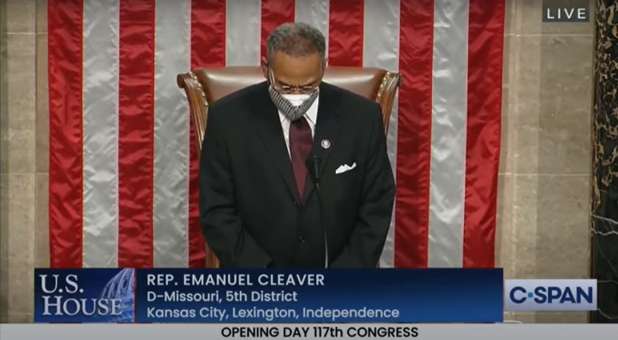Excuse Me, Congressman Cleaver, Brahma Is Not the ‘Monotheistic God’
Rep. Emanuel Cleaver, D-Mo., claims to be a United Methodist pastor, though credentials from a religious organization do not make someone a pastor—only the calling of God can impart that status. He recently ended his prayer over the 117th Congress with an incredible closing, and I do mean “incredible”—a word that literally means “beyond belief.”
I am awestruck. I cannot believe that anyone professing to be a Christian would pray such a heretical and abominable prayer.
Not only is his biblical theology warped beyond recognition, his reference to a Hindu deity is without understanding. As Jesus told the woman at the well, “You don’t know what you’re worshiping” (John 4:22a, ISV).
Here’s the closing statement of his controversial prayer: “We pray to the monotheistic god, Brahma, and ‘god’ known by many names by many different faiths.”
First and foremost, Brahma is not the “monotheistic god.” He is only one of 330 million (the traditional number) gods and goddesses in Hinduism. Since the prefix “mono” means one, Cleaver missed it by 329,999,999.
Maybe he was erroneously trying to reference Brahman (and there is a huge difference even though the two names only differ by the letter “n”). Brahman is considered ultimate reality in Hinduism, an impersonal life force from which the universe was emanated, which is the reason all things are considered divine in essence (in Hinduism and New Age spirituality, its offspring).
Not only did Brahman manifest “itself” (genderless) as the physical cosmos, Brahman also manifested in the pantheon of millions of deities who are worshiped in that belief system. That’s why Hindus say, “There is only one God” because they believe that all individual personal deities, including Brahma, emanated out of this absolute source called Brahman. So, though some would argue otherwise, Hinduism is definitely not monotheistic; it is polytheistic.
There are at least eight substantial theological problems with Cleaver’s prayer:
— First and foremost, as just stated, Hinduism is not monotheistic; it is polytheistic.
— Second, the true God is not an impersonal force; He is a personal God—the everlasting Father.
— Third, the true God exists separate from the universe; He was not manifested as the universe.
— Fourth, the true God never has and never will manifest Himself in multitudes of gods and goddesses.
— Fifth, the true God commanded from Mount Sinai, “I am the Lord your God. … You shall have no other gods before Me” (Ex. 20:2-3, MEV).
— Sixth, to mix the worship of the God of the Bible (Yahweh) with the worship of Brahma is not just spiritual ignorance; it is heresy.
— Seventh, by making this invocation, Cleaver achieved something quite stunning—while professing to represent the God of the Bible, he publicly broke the first of the Ten Commandments and caused all who said “amen” to be complicit in his sin.
— Eighth, since Paul said these false deities are actually demons (1 Cor. 10:20), this supposed minister, whether he did it knowledgeably or not, appealed to demons to bring peace to the congressional proceedings. What? Are you kidding? If there is anything our government does not need right now, it is an infiltration of demon spirits under the guise of benevolent deities.
Let’s focus on the individual deity named Brahma that Cleaver referenced. Of all the millions of gods worshiped in Hinduism, the three primary gods are Brahma (the creator god), Vishnu (the preserver god) and Shiva (the destroyer god). Is this the same as what is termed “The Trinity” in Christianity? Absolutely not!
The true God is made up of the Father, the Son and the Holy Spirit, who are one in essence and always work in perfect harmony. Also, one of the traits of the true God is omnipotence—having all power. Hindu deities often are found subject to humanlike conflicts, passions and weaknesses.
For instance, in one of the sacred writings of Hinduism, Brahma (who originally had five heads) had one of them decapitated by Shiva, the god of destruction. Here is the passage describing that “unfortunate” happening:
Brahma desired Sarasvati and went to her, asking her to stay with him. She, being his daughter, was furious at this and said, ‘Your mouth speaks inauspiciously and so you will always speak in a contrary way.’ From that day, Brahma’s fifth head always spoke evilly and coarsely. Therefore one day when Siva was wandering about with Parvati and came to see Brahma, Brahma’s four heads praised Siva but the fifth made an evil sound. Siva, displeased with the fifth head, cut it off. The skull remained stuck fast to Siva’s hand, and though he was capable of burning it up, Siva wandered the earth with it for the sake of all people, until he came to Benares (Siva Purana, Jnanasamhita 49:65-80).
According to this passage, it could be inferred that Brahma desired an incestuous relationship with his daughter, the goddess Sarasvati (though deities do not propagate like humans so Hindus might insist it was not an incestuous advance). However, this story does prove that Brahma was far from being omnipotent. Quite the contrary, he was vulnerable and weak when attacked by the god of destruction, who is also referred to as the lord of yoga—a connection which needs to be brought out in a future article.
So, Congressman Cleaver, you dared to say in your prayer that “god is known by many names in many faiths,” but the God of the Bible is not the same god as the one described in Hindu scripture, losing one of his heads because of his evil speech. If someone prayed to the Almighty using that name and God responded, He would be validating the myth that goes along with that name—which would be a confusing statement for Him to make.
No—a thousand times no—the one true God is not “known by many names in many faiths.” Only in true biblical Christianity do we find the correct revelation of the nature and name of God. When that true God came to earth in the form of the Lord Jesus Christ, He did not say, “Use any name you want for God and He will respond.”
Quite evidently promoting exclusiveness, Jesus (Yeshua) clearly said: “I am the way, the truth, and the life. No one comes to the Father except through Me” (John 14:6b).
No wonder Paul said, “Everyone who calls on the name of the Lord shall be saved” (Rom. 10:13). Notice, the apostle did not say “a name.” Rather, he said, “the name.”
There is only one God, but that means one God to the exclusion of all others. Many members of the first Congress of the United States must have understood that, because one of their first acts was to print and distribute the Bible—not the Vedas or the Bhagavad Gita—throughout the colonies of our newly formed nation.
May God heal our land and take us back to purity of faith, in Jesus’ name! {eoa}






































